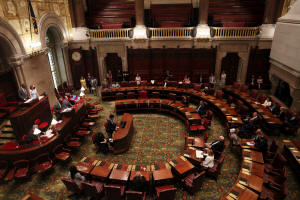Factbox-What's in New York's new gun laws after Supreme Court ruling?
 Send a link to a friend
Send a link to a friend
 [July 02, 2022]
(Reuters) - New York lawmakers revamped the
state's gun laws after a landmark U.S. Supreme Court decision
established an individual right to carry handguns in public for
self-defense. [July 02, 2022]
(Reuters) - New York lawmakers revamped the
state's gun laws after a landmark U.S. Supreme Court decision
established an individual right to carry handguns in public for
self-defense.
The court ruled New York's restrictive gun-license system was
unconstitutional, as were similar regimes in California, Hawaii,
Massachusetts, Maryland, New Jersey and the District of Columbia.
Here are some key provisions in New York's proposed gun-license law
* NO MORE NEED TO PROVE "PROPER CAUSE" TO HAVE A GUN
The Supreme Court said it was unconstitutional to give government
officials the discretion to deny a law-abiding person a permit to carry
a concealed handgun in self-defense if they could not show "proper
cause," or cite some special reason. The bill removes the "proper cause"
requirement, although it still requires an applicant show they are of
"good moral character."
* 'SENSITIVE PLACES' WHERE GUNS ARE BANNED
The court said lawmakers could restrict guns from "sensitive places,"
giving as examples courthouses, schools and government buildings, but
warned lawmakers against applying the label too broadly.

New York's proposed list of such places includes: government buildings,
medical facilities, places of worship, libraries, playgrounds, parks,
zoos, schools, summer camps, addiction-support centers, homeless
shelters, nursing homes, public transit including the New York City
subway, places where alcohol or marijuana is consumed, museums,
theaters, stadiums, polling places and New York City's Times Square.
Private businesses will be presumed to be gun-free zones unless their
owners say otherwise.
[to top of second column]
|

New York Lieutenant Governor Antonio Delgado presides over the State
Senate during a special legislative session to debate new
concealed-carry gun permits at the New York State Capitol in Albany,
New York, U.S., June 30, 2022. REUTERS/Mike Segar

* SOCIAL MEDIA REVIEW
The bill would require applicants for concealed-carry permits to
submit their current and former social media accounts from the last
three years to review by the licensing officer, usually a judge or
police official, to weigh the applicant's "character and conduct."
* INCREASED TRAINING
Applicants must complete at least 16 hours of in-person firearms
safety training, and at least two hours of training at a firing
range, where they must prove their shooting proficiency according to
standards to be developed by state police.
* INCREASED SCRUTINY OF APPLICANTS
Applicants must meet for an in-person interview with the licensing
officer and provide the names and contact information of their
spouse or domestic partner, any other adults they live with and say
whether children are in their home. They must provide four character
references.
* REVIVING AMMUNITION SALES DATABASE
The bill revives a dormant effort to create a state database
tracking ammunition sales to license-holders buying certain kinds of
ammunition.
(Reporting by Jonathan Allen; Editing by Donna Bryson and William
Mallard)
[© 2022 Thomson Reuters. All rights
reserved.]
This material may not be published,
broadcast, rewritten or redistributed.
Thompson Reuters is solely responsible for this content.
 |